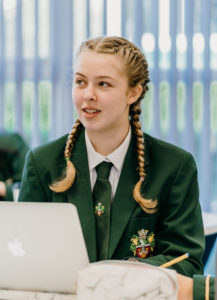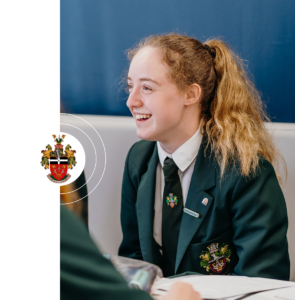Curriculum Intent

Our intent at SHSG is to promote computational thinking and digital creativity. We want our students to develop the foundations to enable them to be discerning, life-long learners in a constantly changing technological landscape. Computer Science is a subject in demand within in a globally competitive world. It has become an ever-growing part of human life, affecting many aspects of a person’s day. Computer systems are embedded ubiquitously in everyday devices, smart phones, washing machines, heating systems and vehicles, as our world embraces “The Internet of Things”. Computer scientists have an impact on how our society advances by developing and maintaining these systems: whether it be for our home, work, learning or entertainment environments. Computer Science is an exciting and rapidly evolving subject that offers excellent employment prospects and well-paid careers. The Computer Science department aims to develop the mind-set of a computer scientist through equipping students with the skills to participate in a rapidly-changing world. The curriculum journey incorporates challenging and engaging topics, giving students the opportunity to develop their capability, creativity and subject knowledge. It also capitalises upon, and feeds into, learning within other subject disciplines including mathematics, science and design and technology. It is these opportunities that enable students to develop and hone skills that can be applied in day-to-day life. Steve Jobs said “Everyone should learn how to code, it teaches you to think.” Computational thinking is an essential skill for everyone to have and helps in all subject areas and careers. The curriculum has been designed to ensure learners have sufficient knowledge to stay safe online and use computers safely in life. We want students to not only understand how to use technology effectively, safely and responsibly, but also how technology is developed and constantly redeveloped into new and exciting tools. The curriculum also provides a focus on developing resilient learners who are able to recover from mistakes and effectively solve problems. This will help develop a lifelong effect of learning and how to develop themselves further and prepare for the future.
What does it feel like to be a student in the Computer Science Department?

Computer science will teach you skills that are applicable to many situations – you must be logical and able to identify key points within a problem, you need to be able to explain how a system is appropriate for a situation and justify your answer, you need to be able to understand and write algorithms and work with binary numbers. You don’t need to be a computer programmer to use these skills they are applicable to lots of different careers and even within computer science there are multiple career pathways to explore.
During project work you are asked to come up with a system you would like to build and take it from the idea stage, analyse the requirements, then design, build and test it. This allows you to be as creative as you like and explore languages and systems you are interested in. It is really a great way to showcase your programming talents and build something you are passionate about.
There is quite rightly an importance placed on coding ability and the ability to think logically, computing provides the opportunity to develop these skills. There’s also a large element of research and finding existing solutions to problems, the ability to read and understand other people’s programs is instrumental in developing your own knowledge.
By nature, computer science is a very challenging subject. It involves many areas from how computers functions to how to operate one. Due to this, the subject is inherently difficult, but is very rewarding. The skills you gain by being challenged will aid in life and feel very fulfilling acquiring.
Again, many concepts and projects are a challenge, requiring students to be able to construct and document a functioning system within their ability, whilst also increasing their ability concurrently. This is a struggle, but I believe there’s nothing more satisfying than that “ah ha!” moment when you get a program to finally run, or you fix that annoying bug.
The challenging and mentally stimulating tasks will show you what you are capable of and will help improve your thinking and problem-solving ability, which will be greatly applicable in the future. The ability to decompose massive problems into workable steps is another skill. Many people rightly feel overwhelmed by the thought of a huge project, however being a computer scientist teaches you how to abstract unnecessary information and devise a very manageable and scalable solution step by step. You learn all sorts about the world. Due to the nature of the subject, you end up consistently looking into contemporary topics, with the course needing you to be aware of current affairs, legislation and technology, you are always up to date on happenings.
We will support you by regular open house drop-in sessions at lunchtimes for you to work with others and get help from both peers and teachers. We use online collaborative tools such as Teams, Office 365 and Onenote to enhance your learning and make resources available from any location. In addition, we will signpost and direct you to useful websites that will allow you to work independently and build your retrieval of key concepts so that you are prepared and ready for the challenges of assessments and examinations. Students regularly have gone on to pursue Computer Science at degree level at the UK’s top universities and shown that they were inspired to choose a career path that directly led from their Computing education and experiences here at SHSG.
Please click on the button below to download the assessment policy for Computer Science.
